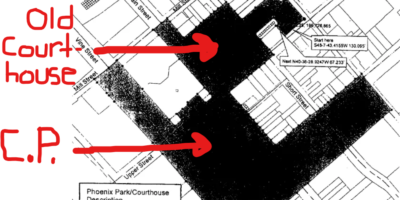Kentucky’s new state bank
By Danny Mayer
On July 1, JP Morgan Chase became the Commonwealth’s bank . As the state’s official depository, J.P. now receives all deposits, writes all checks and makes all wire transfers on the $12-15 billion that flow through Kentucky state government in the course of a fiscal year. It will cut payroll checks, receive federal and other funds earmarked for the state, and disburse educational or transportation or any other funds to their appropriate monetary endpoints. For its trouble, the bank will receive $1.3 million in state fees and the ability to re-lend idle state funds out to customers for private gain.
Yes, you should be worried.
A global corporation with more than $2 trillion in assets and operations in 60 countries, JP Morgan Chase has been a major figure in the ongoing global financial crisis. As one of the largest private banks in the U.S., the bank made incredible amounts of money by underwriting many of the questionable loans (sub-prime, zero down, adjustable rate) that fueled the American housing bubble. It then made even more money by packaging hundreds of these shitty loans into a single “product,” a mortgage backed security, which it sold like Twinkies to pious religious non-profits, filthy-rich hedge fund managers, municipal fire-fighters, retired auto-workers, and the like, each security effectively putting these groups on the hook—and not J.P.—for the shitty loans that it had helped create.
When, inevitably, individual homeowners began to default on their loans, thereby triggering the stock market collapse of 2008, J.P. Morgan found a way to make money on that, too, by buying insurance (known as credit default swaps) on the shitty securities of shitty mortgages that it had sold to unwitting investors. For good measure, the U.S. government handed the corporation $25 billion in TARP funds, $30 billion in U.S. treasury backing to purchase bankrupt Bear Stearns (previously a global leader in mortgage backed securities), and the biggest chunk of the $129 billion of taxpayer-provided money earmarked for creditors of bankrupt credit default swaps provider AIG.
Since 2002, the bank has turned its attention to another easy revenue source: city, state and national government debt. Along with other large banks like Goldman Sachs, it began selling a new type of complicated loan to countries like Greece, states like Connecticut and Mississippi, and cities as far-flung as Birmingham, Alabama, and Milan, Italy. Even the Delaware Port Authority and the Pennsylvania school system have gotten caught in the J.P. trap.
These “derivative packages,” called “swaps” to ensure they do not get officially counted as debt on government balance sheets, essentially act as second and third and fourth-mortgages on public infrastructure projects like airports and highways. Loaded with adjustable rates and a slew of fees and “trigger points” that ensure rapid debt growth, the swaps essentially ensure the privatization of public government assets. In the case of Birmingham, Alabama, for example, Rolling Stone journalist Matt Taibbi has reported how a city sewer project initially estimated to cost $250 million generated “a total of $1.28 billion just in interest and fees on the debt,” most of which went into the private coffers of J.P. Morgan. The result for Birmingham? “Between 2008 and 2009,” Taibbi notes, “the annual payment on Jefferson County’s debt jumped from $53 million to a whopping $636 million.” The debt now stands at $4800 per resident.
This is the corporation that our state leaders have chosen to safeguard and disperse public state money.
Local first
In the most recent of a slew of fraud-related lawsuits targeting JP Morgan’s financial transactions, the corporate giant has been forced to pay $228 million in damages for rigging bids on municipal bonds—public debt incurred to pay for expensive infrastructure projects. The lawsuit accused JP Morgan of insider dealings that inflated the taxpayer cost on over 90 projects spanning 31 states. As is standard in these cases, the money the bank was forced to pay back reflected only a percentage of what they made off the deals, quarters on the dollar. What’s more, because the settlement did not require the bank to admit guilt, it has been effectively insulated from any future litigation on behalf of the specific localities that were defrauded.
One of these states, it should be known, is Kentucky. A small blurb appearing in the July 13 Herald-Leader, less than 2 weeks after state leaders made JP Morgan Chase our Commonwealth bank, cited two separate bid-rigging schemes that had made their way onto the 31-state lawsuit: Western Kentucky’s Henderson County received $224,000 from the lawsuit, while the University of Kentucky stood to recoup $66,000 as part of the settlement.
“The issue with UK,” the Herald-Leader blurb reported, “involved a series of bonds totaling $18.695 million dating to May 2001” for the Peter H. Bosomworth Health Sciences Research Building (described by UK as “the Medical Center’s marquee research facility”) and its utility infrastructure.
Writing in response to the J.P. lawsuit on his Rolling Stone blog, Taibbi lamented that big banks were getting away with crimes that, when pulled off by blue-collar muscle outfits like the mob (and they are), result in lengthy jail sentences. Fraud on the part of JP Morgan and other corporate banks, he concluded, is “not going to stop until people start doing hard time for these crimes.”
Unfolding events here in this state attest to how far we still have to come. Not only is JP Morgan not prosecuted here, in Kentucky we seem hellbent on giving them the keys to our kingdom, too.




1 Pingback